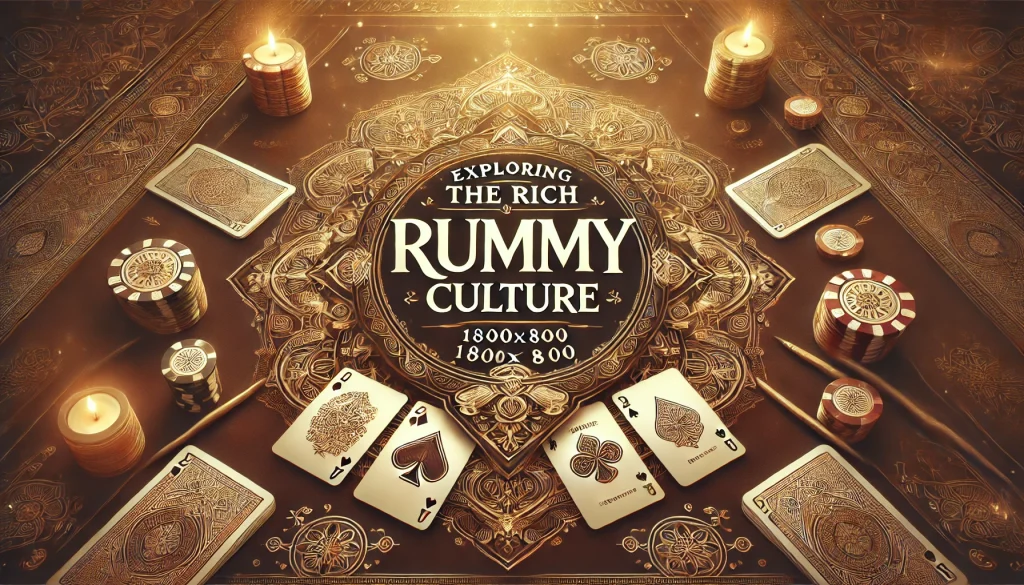
The Complete Guide to Rummy: Origins, Variations, Rules, Etiquette, Advantages, Contests, Cultural Impact, and Future The card game rummy has been a player favorite for centuries, dating back to the early 1800s. Although its exact origins are a little unclear, it is generally accepted that Rummy developed from earlier games like the Mexican-originated Conquian. Due to its similar mechanics of creating melds and sets, Conquian is frequently considered the forerunner of modern Rummy. The variety of Rummy games we see today is the result of numerous adaptations made to the game as it traveled across borders. Rummy had arrived in the United States by the late 1800s, where it quickly became very popular & started to take on new forms, such as Indian and Gin Rummy. Over the course of the 20th century, rummy continued to evolve & thrive across cultural boundaries.
Played in homes all over America and abroad, the game became a mainstay of family get-togethers and social events. Its broad appeal was aided by the addition of new variations and regulations. In contrast to Indian Rummy, which included special features like jokers and wild cards, Gin Rummy developed as a quicker-paced variation that prioritized skill & strategy.
Rummy was further thrust into the digital era by the emergence of online gaming platforms in the twenty-first century, which enabled players to interact and compete from all over the world. As a living example of its rich past, rummy has developed from a straightforward card game to a popular past time that is loved by millions of people all over the world. Recognizing Variations in Rummy.
Rummy is not a single, universal game; rather, it has many different variations that are influenced by culture and regional tastes. Developed in the United States in the early 20th century, Gin Rummy is one of the most well-known varieties. Players in this two-player game must make strategic decisions & play quickly in order to form sets and runs while accumulating as few deadwood points as possible. Rummy Variations by Region.
Played with two decks of cards and featuring jokers as wild cards, Indian Rummy is another noteworthy variation. This variation, which is played both socially & competitively, usually has more players and has become very popular in India. Beyond these popular variants, rummy comes in a wide variety of other forms to suit a range of tastes & inclinations. Special Takes on the Traditional Game.
For instance, the Jamaican variation Kalooki is distinguished by its use of several decks and distinctive scoring method. The gameplay is further complicated in Contract Rummy, which adds a number of preset contracts that players must fulfill in every round. Other variants include Canasta, which combines Rummy mechanics with extra card-melding rules, and Oklahoma Rummy, which borrows elements from poker.
Players can find a version that fits their style and skill level because each variation offers a different take on the timeless game. Players of all ages can play Rummy because its basic rules are quite simple. Forming sets (three or four cards of the same rank) or runs (three or more consecutive cards of the same suit) is the goal of this game, which is usually played with a standard deck of cards. At the conclusion of their turn, each player discards one card after drawing cards from the discard pile or the stockpile. Until a player successfully melds every card in their deck or hits a certain score, the game goes on.
Although many variations of Rummy follow these fundamental guidelines, some may add new rules or scoring schemes that players need to become acquainted with. In order to become proficient at Rummy, players must create winning strategies. Paying careful attention to your opponent’s draws & discards is an important tactic because it can reveal important information about their hands and goals. Also, players should hold onto cards that have the potential to form multiple melds in order to maintain the flexibility of their own hand. As the game goes on, this versatility makes it possible to create more sets or runs. Keeping track of one’s deadwood points—cards that aren’t in any meld—is also essential because it can be very important to minimize these points when another player leaves.
Players can dramatically increase their performance in Rummy by fusing strategic thinking with an awareness of their opponents’ moves. It can be fun to play rummy with friends and family, but maintaining good manners is crucial to making sure that everyone has fun. Respecting the game’s tempo is a basic rule; some players may make decisions more methodically, while others may favor a faster tempo. Recognizing this distinction can make the environment more pleasurable for everyone. It’s also crucial to discuss any house rules or variations in an open manner prior to the game commencing. In terms of gameplay, this openness guarantees that everyone is in agreement & helps avoid misunderstandings.
Sportsmanship is another essential component of Rummy etiquette. Gently winning or losing is essential to creating a supportive gaming environment. Players should support one another during the game and celebrate good plays rather than excessively gloating over wins or expressing frustration over losses. Also, it’s critical to exercise patience with less seasoned players who might require additional time to understand the rules or strategies of rummy. Providing direction without being patronizing can increase their enjoyment and inspire them to play more in the future.
Players can foster a polite and entertaining environment that improves their shared experience by following these etiquette guidelines. There are many cognitive advantages to playing rummy that go beyond simple enjoyment. As they examine their hands and plan their moves using the information at hand, players of this card game must use critical thinking abilities. Over time, this mental practice can help with problem-solving and memory retention. By evaluating possible outcomes based on their choices and those of their opponents, Rummy also helps players hone their analytical abilities. Players may discover that their increased ability to spot patterns and make calculated decisions translates to other facets of their lives.
Beyond improving cognitive abilities, rummy is a great way to entertain and engage with others. As friends & family get together around a table to socialize & compete amicably, the game strengthens their bonds. In today’s fast-paced world, where meaningful interactions are frequently hard to come by, this social component can be especially helpful. Also, Rummy can offer a delightful diversion from everyday stressors, enabling participants to lose themselves in an enjoyable pastime that fosters relaxation and friendship.
Rummy is a popular past time for many people because it provides a special combination of social interaction and mental stimulation, whether it is played competitively or casually. The excitement of competing. The competitive element of rummy gives the game a thrilling new dimension and encourages players to improve their gameplay and strategy. Online platforms have completely changed competitive Rummy by providing players worldwide with virtual tournaments in addition to the customary in-person events hosted at neighborhood clubs or community centers.
Internet competitions and innovations. To further encourage participation from ardent gamers, these online contests frequently offer cash prizes, rankings, and leaderboards. It’s probable that even more creative formats for competitive play will appear in the future as technology develops. A group of enthusiasts. Rummy fans can improve their skills and build relationships with other players who are as enamored of this classic card game by taking part in tournaments.
Rummy’s impact goes beyond card games into popular culture, as it has been featured in television series, films, and books. Because of the game’s strategic qualities, it frequently works well for storytelling; in fact, filmmakers regularly employ it to highlight character dynamics or create tension in stories. Scenes with intense Rummy matches, for example, can be used as metaphors for more significant character rivalries or conflicts. These depictions demonstrate not only the game’s widespread appeal but also its capacity to capture themes of rivalry and unity. Rummy has also been used in literature by writers as a metaphor for interpersonal communication or character development.
Friendly games between characters frequently hint at deeper conflicts or relationships that develop throughout the narrative. Also, over time, Rummy instruction books have appeared, celebrating the game’s rich past while providing insights into tactics. Rummy is likely to continue to be a part of popular culture as media continues to change, with new platforms like social media channels and streaming services becoming more well-known. It will continue to captivate the interest of future generations while still being relevant in modern storytelling.
Rummy is a popular card game that keeps evolving & adapting as we progress into the digital era. The emergence of online gaming platforms has changed the way that people play rummy; players can now communicate with people anywhere at any time, which makes it simpler than ever to locate opponents or enter tournaments without ever having to leave their homes. Its resurgence among younger audiences who might favor digital interactions over conventional face-to-face gameplay has been greatly aided by its accessibility. Also, players can now enjoy Rummy while on the go thanks to innovations like mobile applications, which make it easy for them to fit gaming into their hectic schedules.
These applications frequently include features like advanced analytics for seasoned players looking to improve or tutorials for novices, guaranteeing that both novices and seasoned gamers get something out of their gaming experience. It is obvious that this age-old hobby will continue to be popular for many years to come as technology continues to influence how we engage with games like Rummy, carrying on its tradition as a beloved past time for people all over the world for many generations to come. In conclusion, Rummy is an intriguing topic deserving of investigation due to its varied variations and rich history. There is much more to this classic card game than meets the eye, whether it is played competitively at tournaments or casually among friends. From learning its history to grasping gameplay tactics or appreciating its cultural significance, Rummy has something unique to offer everyone who picks up a deck!




